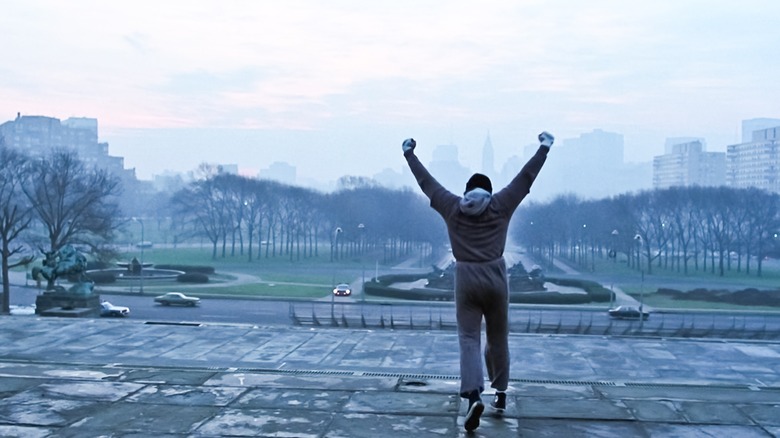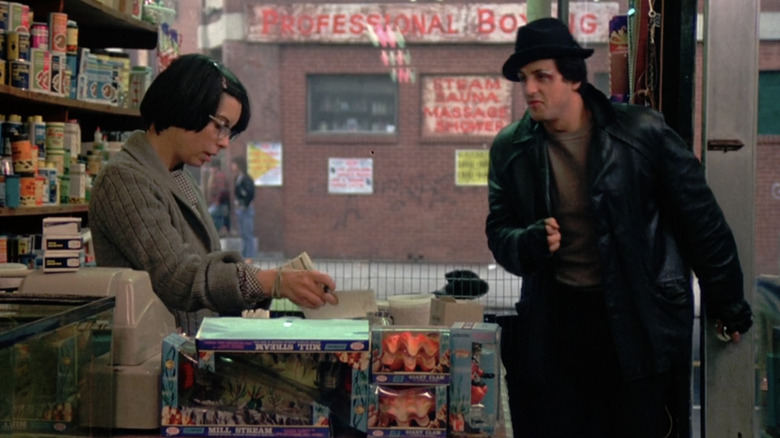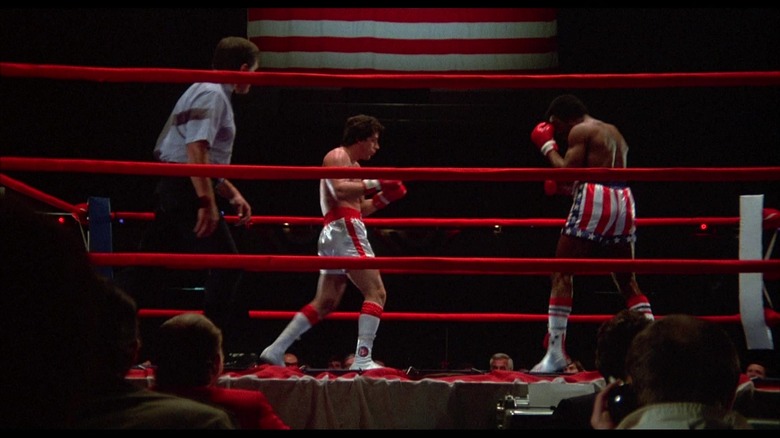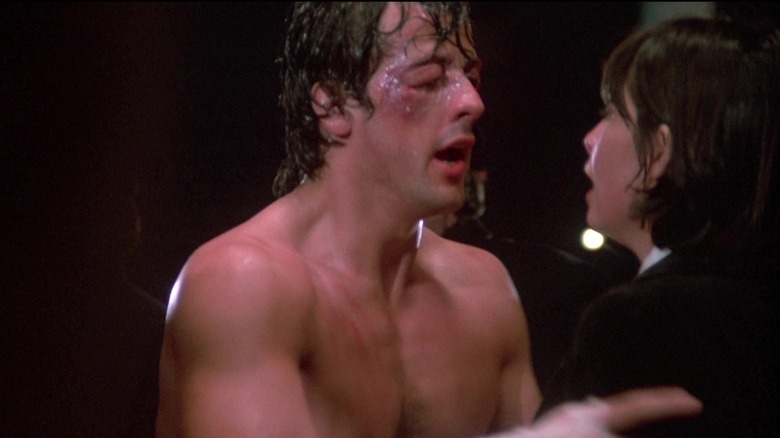
In March 1975, a slugger named Chuck Wepner, aka "The Bayonne Bleeder," stepped into the ring to face the heavyweight champion of the world, Muhammad Ali. A title shot meant Wepner had the luxury of training full-time for the first time in his career, and he would earn $100,000 for the fight. Meanwhile, according to Time, the champ was guaranteed a $1.5 million payday from the event
The 40-to-1 underdog kept pace with Ali for eight rounds, before the unthinkable happened in the ninth. His face looking like roadkill, Wepner doggedly marched towards Ali and surprised him with a big right to the ribs, knocking the champion down for the fourth time in his illustrious career.
Ali rose and punched away at Wepner before finally knocking him down in the last round. Wepner tried to get back up, but the referee stopped the match. He was just 19 seconds away from taking Ali the full distance.
One person watching that night was Sylvester Stallone, a struggling actor barely known for roles in "Death Race 2000" and "Capone." Inspired by Wepner's unlikely heroics, he dashed out a screenplay about a Philadelphia brawler who gets a shot at the world title. We know it today as "Rocky."
In an underdog success story comparable to Wepner's, Stallone not only got his script to the screen, he also starred in the thing. The studio wanted an established star like Robert Redford or James Caan to play Rocky, but Stallone's agents stuck to their guns and Stallone got the part. "Rocky" was a roaring success; Stallone received two Oscar nominations, for Best Actor and Original Screenplay, while the film won Best Picture.
"Rocky" now has a reputation as one of the greatest underdog sports movies of all time, yet it doesn't quite fit the usual template. What exactly happens at the end?
So What Happens In Rocky Again?

Heavyweight champion Apollo Creed (Carl Weathers) is planning a title bout in Philadelphia to coincide with the bicentennial of the United States, but when his opponent drops out, he decides to give a local unknown a chance instead. That local is Rocky "The Italian Stallion" Balboa (Stallone), picked by Creed because he thinks the nickname is pretty catchy.
Rocky is a down-on-his-luck brawler living in a tough working class neighborhood. His boxing career is going nowhere, scraping a few bucks from fights in grotty clubs and working as a heavy for a loan shark. After he is picked for the Creed fight, the hard-bitten owner of his local gym, Mickey (Burgess Meredith), offers to train him. Rocky isn't keen on the idea because Mickey always treated him like a loser in the past, but eventually, he decides to give the old man a shot.
Meanwhile, Rocky starts dating Adrian (Talia Shire), a painfully shy young woman working at a pet shop, thanks to a little help from her boorish big brother Paulie (Burt Young), Rocky's best friend.
Rocky trains hard for the fight, pounding the streets of the city and beating up on sides of meat, while Apollo doesn't take his competition too seriously. On the eve of the fight, Rocky suffers a crisis of confidence. He doesn't think he can beat Creed, but he still wants to prove himself. Surely he can't win... can he?
Rocky The Underdog

We all know the drill by now. The plucky rank outsiders are trailing with a few seconds to go against the favorites, and wouldn't you know it, somehow they pick themselves up and pull a win out of nowhere for a rousing, if completely improbable, victory. It's a well-worn staple of sports movies, from the game-deciding tiebreaker shot in "The Mighty Ducks" or the mini golf inspired winning putt in "Happy Gilmore," to the crane kick in "The Karate Kid."
Underdog sports movies existed before the "Rocky" movies — "The Champ," for instance — but Stallone's character popularized the tropes that would become increasingly cartoonish with each sequel, reaching the wacky zenith/nadir in "Rocky IV." After Stallone couldn't resist making Balboa the champ in "Rocky II," he had to resort to ever more outlandish lengths to make him the underdog again. By the time he stepped into that Moscow ring to face Ivan Drago, he was basically up against an invincible, killer, Russian cyborg in a superhuman slugfest, somehow surviving Drago's thermonuclear punches, winning the fight, and ushering in the end of the Cold War. All that said, the original film doesn't end in a bell-beating knockout punch from the underdog. It ends with both men still standing.
It's always a surprise to see how gritty and low-key "Rocky" is, working as more of a character study than a sports movie. It's quiet and talky, without the cock rock bombast of later entries, at least until "Gonna Fly Now" finally kicks in as Rocky heads out for his morning run. In a series synonymous with overblown training sequences, even this original montage is restrained, but it's still iconic. After all, who hasn't jogged up a long flight of steps and done a Rocky-style celebration at the top?
I have fond childhood memories of the "Rocky" movies, with my whole family cheering Rocky on from our living room. It's easy to make fun of the "Rocky" series for how unrealistic the boxing is, especially when you see how silly the franchise gets. But even so... there is just something about these movies that still gets people punching the air no matter how many times they've seen them.
Rocky Ending Explained

During the climactic fight in "Rocky," the two fighters make a cagey start, with Rocky using his trademark technique of blocking his opponent's punches with his face. Then, to the astonishment everyone watching, the challenger ducks under a big right hook and almost takes Apollo's head off with what looks like a precursor to the Shoryuken move from "Street Fighter II," sending Creed sprawling.
It's the first time Apollo has been knocked down in his career, and when he recovers, he takes Rocky a bit more seriously. They hammer away at each other for the next fourteen rounds, fighting themselves to exhaustion. Rocky can hardly see and Apollo is suffering from broken ribs, but neither fighter wants their trainer to end the match. Rocky is in on the verge of coming out on top just as the final bell rings.
Rocky doesn't care about giving interviews after the fight. He just wants Adrian. Winning or losing on points isn't important to him. In fact, we only hear that Apollo won the split decision in the background as Rocky and Adrian embrace. The Italian Stallion did everything he wanted to achieve by taking Creed the distance, something no other fighter has done before. He proved to himself and everyone else back home that he's not "just another bum from the neighborhood."
The ending of "Rocky" is as humble as its hero. The fight almost ends mid-action, with the music kicking in a few seconds after the bell to confirm this triumphant moment. Neither man wants a rematch, and it's a moral victory for Rocky because Apollo didn't take him seriously until he was knocked down. With a new sense of self-worth, Rocky can walk away with Adrian without caring about the loss, because his achievement is massive for a fighter of his lowly stature in the sport. But of course, we all know there are many more fights yet to come, both inside and outside of the ring.
Read this next: 14 Sequels That Truly Didn't Need To Happen
The post Rocky Ending Explained: Not Just Another Bum from the Neighborhood appeared first on /Film.
